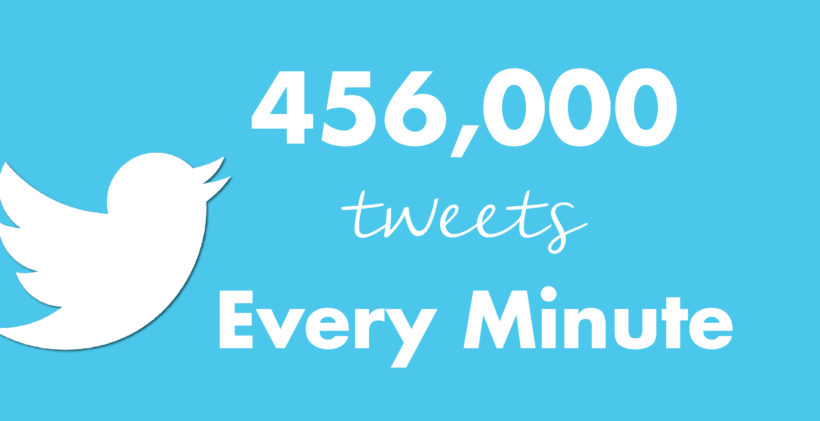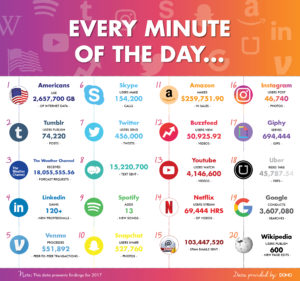Why Do People Share Things Online? [Infographic]
The last few years have seen an explosive growth in online sharing. Businesses and organizations are scrambling to utilize and monetize these channels butit’s not easy to keep up with the pace. To illustrate just how much information gets shared online, data firm Domo released a study showing how much data was shared and generated on the internet every minute of 2017.
We created a helpful infographic so you can see just how much information gets created and shared every minute of the day:
The sheer volume is dizzying. These channels offer an obvious goldmine of opportunities for marketers but they can be utterly useless if we don’t grasp the psychology of why people share information online.
[bctt tweet=”Social media networks can be utterly useless if we don’t grasp the psychology of why people share information online.” username=”Precision_blog”]
Why do People Share Things Online?
In 2011, the New York Times Customer Insight Group released a study titled, The Psychology of Sharing. In it the authors attempted to identify the key reasons people share content online. The study included a survey of more than 2,500 content sharers online. And what they found was as fascinating as it was illuminating.
The study showed people share content online primarily for the following 5 reasons:
- 1. To bring valuable, enlightening and
entertaining content into the lives of people
they care about - 2. To define themselves
- 3. To grow and nourish their relationships
- 4. Self-fulfillment
- 5. To get the word out about causes they
believe in
Let’s break them down one by one. For each category we’ll provide more information offered in the actual study, and we’ll also try to add some deeper insight into the motivation and psychology behind each one.
1. To bring valuable, enlightening and
entertaining content into the lives of people
they care about
“90% of people share to help someone have a positive experience (or avoid a negative one), and nearly as many (89%) share to help others save money.”
[bctt tweet=”90% of people share to help someone have a positive experience and nearly as many (89%) share to help others save money.” username=”Precision_blog”]
Deeper Insight
So reason #1 says people share to help others they care about. But why do people like to help others?

University of Minnesota psychologist Mark Snyder has been studying the psychology of volunteering since the 1980s. In a 1999 study he uncovered several reasons for why people volunteer. The American Psychological Association rounded it up as follows:
1. Values. Volunteering to satisfy personal values or humanitarian concerns. For some people this can have a religious component.
2. Community concern. Volunteering to help a particular community, such as a neighborhood or ethnic group, to which you feel attached.
3. Esteem enhancement. Volunteering to feel better about yourself or escape other pressures.
4. Understanding. Volunteering to gain a better understanding of other people, cultures or places.
5. Personal development. Volunteering to challenge yourself, meet new people and make new friends, or further your career.
Unlike actual volunteer work, sharing online doesn’t offer much in the way of tangible help. So when it comes to sharing content online, it would seem that reasons #3 and #5 are most applicable. People will share online in a way that helps others they care about to feel better about themselves and escape other pressures, and to challenge themselves, meet new people, make new friends and further their careers.
[bctt tweet=”People will share online in a way that helps others they care about to feel better about themselves.” username=”Precision_blog”]
Snyder and his colleagues have also found that people who have less altruistic motivations, like the ones we just mentioned, will stick with a volunteering organization longer than people with more altruistic motivations, like humanitarian values. This may explain the vastness of volume that gets shared online each and every minute. However, a post about 55 gallon trash bags 0r plastic wraps for moving won’t immediately motivate someone to share.
Let’s move on to the next finding of The New York Times study.
2. To define themselves
“As one respondent explained, ‘I try to share only information that will reinforce the image I’d like to present: thoughtful, reasoned, kind, interested and passionate about certain things.'”
[bctt tweet=””I try to share only information that will reinforce the image I’d like to present: thoughtful, reasoned, kind.”” username=”Precision_blog”]
Deeper Insight
 People generally like to portray an image of themselves that is more flattering than reality. The internet and social media make this simple and easy. Photo editing tools and the like allow people to be perceived in a much more favorable light. Even the types of content they share can offer insight into the type of person you are. Sharing cool content is a ticket to increased social status
People generally like to portray an image of themselves that is more flattering than reality. The internet and social media make this simple and easy. Photo editing tools and the like allow people to be perceived in a much more favorable light. Even the types of content they share can offer insight into the type of person you are. Sharing cool content is a ticket to increased social status
The way people portray themselves will vary from culture to culture:
“People may seek to enhance their self image by rating themselves on attributes that are highly valued in their cultural context.” – Professor Chiu Chi–yue, Handbook of Competence and Motivation
Does your content make people feel cool when they share it?
[bctt tweet=”Does your content make people feel cool when they share it?” username=”Precision_blog”]
3. To grow and nourish their relationships
80% share information with others as a means of staying connected when they wouldn’t otherwise keep in touch. And 73% share content online to help them connect with others who share their interests.
This part hardly needs elaboration. People who value their relationships constantly seek ways to nurture them. In many cases, sharing useful and meaningful content with people you love will deepen your relationship.
But note that online sharing alone is no substitute for real relationships. They are only meaningful or helpful insofar as they are buoyed and complemented by real, offline relationships. See iGen, by Dr. Jean Twenge.
4. Self-fulfillment
“69% reported that sharing information makes them feel more involved with the world.”
5. To get the word out about causes they
believe in
“84% of people share information as a way to support causes (or brands) they care
about.”
[bctt tweet=”84% of people share information as a way to support causes (or brands) they care about.” username=”Precision_blog”]
These two reasons align pretty well with Dr. Snyder’s findings we mentioned above that one of the reasons people volunteer is “to satisfy personal values or humanitarian concerns. For some people this can have a religious component.” And “to help a particular community, such as a neighborhood or ethnic group, to which you feel attached.”
To Sum it All Up
The key takeaways here are that people share things they find interesting, helps them build relationships, and aligns with their self-identity and worldview. When crafting the content you’re going to share online, keep all of these factors in mind. If it fulfills one or several of these factors, you dramatically raise the chances of your content being shared.
As always, feel free to leave a comment. And if you found this helpful, don’t forget to share it with your friends and colleagues.



Insightful and thought provoking.
Thanks for taking the time to read and for the comment, Zev.
Hello ,
I saw your tweets and thought I will check your website. Have to say it looks very good!
I’m also interested in this topic and have recently started my journey as young entrepreneur.
I’m also looking for the ways on how to promote my website. I have tried AdSense and Facebok Ads, however it is getting very expensive. Was thinking about starting using analytics. Do you recommend it?
Can you recommend something what works best for you?
I have subscribed to your newsletter. 🙂
Regards
Jan Zac
Hi, Jan. Thanks for subscribing and for your kind comments. As for your question, we’re very focused on creating content that people want to share organically. Figure out what your audience likes and provide them with useful content. Get active on social media and promote your content there. This way you will reach people who are already interested in your topics.
Having said that, there still is room for paid ads but they should always be targeted to an audience that is already inclined toward your topics. I recommend you read this guide:
https://neilpatel.com/blog/beginners-guide-to-running-facebook-ads-that-convert/
Hope this helps. All the best,
Avrumi
I’m really happy to say it was an interesting post to read. I learned new information from your article, you are doing a great job. Continue
Really This goes far beyond the commenting! It wrote his thoughts while reading the article amazingly
I am really happy to say it’s an interesting post to read . I learn new information from your article , you are doing a great job . Keep it up